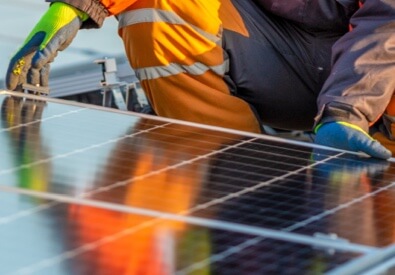We believe in the promise of clean energy and are committed to help lead that transition to a brighter future. By generating more energy from renewable resources, deploying new technologies and modernizing the grid to achieve a low- to no-carbon future, we are at the forefront of this transformation.
Are Solar Panels Right for You?
Installing solar panels can reduce your impact on the environment and potentially your electricity cost. There's a lot to think about when determining if solar panels are a good option for you. Before you make a decision, consider some of the facts and read our helpful guide.
While we’re responsible for interconnecting solar panels to the grid and we can help you with connecting to our equipment (such as meters), your Retail Electric Provider (REP) oversees your billing, which may or may not be affected by the installation of solar panels. Contact your REP about their policies and procedures before you make a decision.
-
Energy Independence
-
Typically, solar panels supplement electricity you buy from a REP and cannot operate independently of the electric grid unless it’s specifically designed to provide back-up power. For safety, most solar panels shut off during an outage, so they may not power your home or business during a service disruption. Also, you’ll need to connect to the electricity grid to be compensated for the excess energy your panels produce if your REP offers such a program. Not all of them do.
-
Selling Surplus Energy
-
When you generate more energy than you use, that surplus energy is added to the electric grid and our meters will measure it. While we make the surplus measurements available to your REP, they may or may not credit you for the surplus. Do not count on “selling back” to your REP any excess energy until you verify with them the policies and rates that apply to your account.
-
Lease or Buy
-
When you lease a solar panel system, you can use the power it produces, but a third party owns it.
You then pay that company to lease the equipment.
When you purchase a system, you pay up front to install and own the panels, or finance the purchase and pay the costs of the equipment plus interest over time (typically 7-20 years).
You're also responsible for maintenance and repairs.
Whether you decide to lease or buy, it's important to review your contract and ask questions before agreeing to either option.

Helpful Guide for Homeowners
If you’ve been thinking about installing solar panels on your home, check out our guide.
Download our guide
How to Apply For Interconnection Service
Before you install your solar panels, wind turbines or other distributed energy resources, and before you connect to our grid,
you'll need to submit an interconnection service application.
Once approved, you can install the system, and following a successful inspection of your equipment, you'll submit a signed agreement with us that governs the arrangement.
Read our Interconnection Quick Start Guide and customer packet to learn more about the interconnection process.
Apply for interconnection